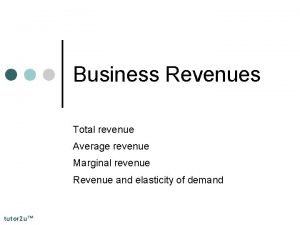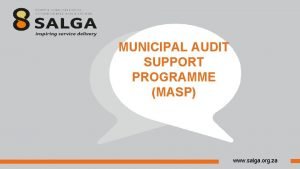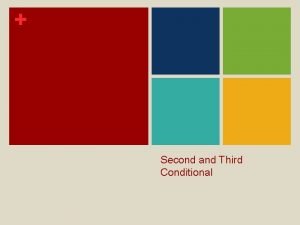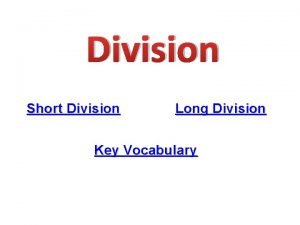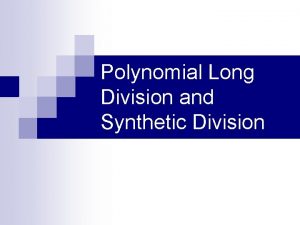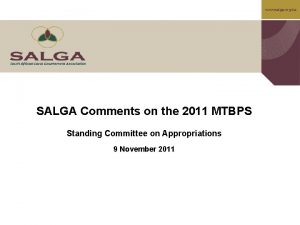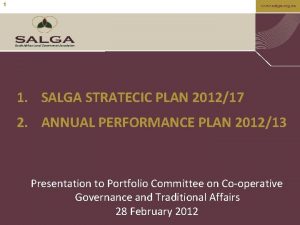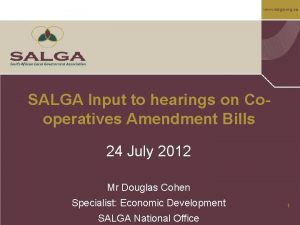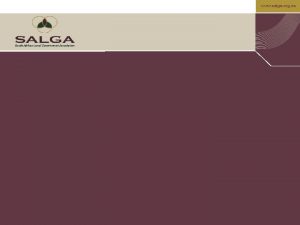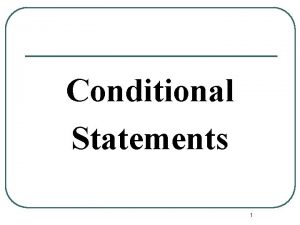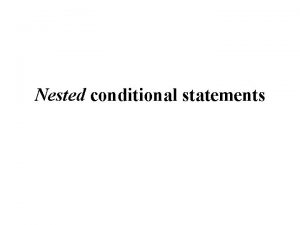SALGA Comments on Conditional Grants Division of Revenue













- Slides: 13

SALGA Comments on Conditional Grants Division of Revenue Bill, 2010 5 March 2010

OUTLINE Ø 2010 MTEF Ø Direct vs Indirect Conditional Grants Ø Infrastructure Grants ü General comments ü Specific Comments on different grants Ø Capacity-building and other operating Grants ü General comments ü Specific Comments on different grants Ø Do. RB Clauses ü Section 20 – Unspent Conditional Grants

2010 MTEF General Comment Ø The 2010 Budget provide important support for local government to sustain service delivery as the economy starts to recover Ø SALGA understands that additional funding is made available to LG for: ü Free basic electricity ü Eradication of infrastructure backlogs by 2014 ü Provision of bulk infrastructure for water and sanitation ü Fast track the provision of water and sanitation in rural areas Main Concerns Ø Growth in the LGES of 15% per annum over the next three years is only towards continuing current levels of services given the high increases in the bulk price of electricity. What about other services or reworking of the formula? Ø The funding need of local government is enormous and municipalities with low revenue raising capacity require further fiscal support to broaden service delivery to generally poor communities Ø Smaller municipalities struggle to maintain institutional capacity for effective local governance and administration Ø Larger municipalities are facing increasing growth in backlogs with declining gearing capacity

Direct vs Indirect Transfers Direct transfers Ø transfers made directly from a transferring national or provincial department into the primary bank account of a municipality ü LG Equitable Share ü Conditional Grants Ø CGs are application based at level of indicative allocation over MTEF (submission of business plans and project plans) ü Not all municipalities are aware of the relevant application processes ü Municipalities must be supported to institutionalise key management processes resulting from participation in conditional grant programmes ü Monitoring processes should be streamlined to ensure efficiencies in grant management

Direct vs Indirect Transfers Indirect transfers Ø transfers made to a national department or dedicated organisation in terms of the Division of Revenue Act Ø Conditional Grants ü Infrastructure ü Capacity building Ø Communication of these grants should be improved as municipalities are not always sure of how these grants work ü indicate in IDP as projects benefiting municipality ü reflect in municipal budget as benefit, but not part of fundable budget ü implementing national departments and public entities must streamline management of these grants and improve communication with municipalities

Infrastructure Grants General comment Ø Real growth of 7% in total infrastructure grants over the MTEF is welcomed ü Fast track the eradication of backlogs ü Support economic growth Ø Need for alignment of infrastructure grants to cities Ø Need for focused national funding solutions with support from DBSA loans to smaller municipalities where it is merited Main Concerns Ø Link to real backlogs questionable since latest data is not available Ø Increase capital spending, but no adequate support for operational and maintenance costs Ø Lack of technical capacity to implement and oversee major capital projects Ø Growth in grants contributes to lower appetite for borrowing Ø Reporting burden, costly and time consuming: ü 13 different grants and 7 different departments ü Not enough information on how grants work Ø Grants from provincial departments not always gazetted

Infrastructure Grants continue Specific comments • Rural Transport Services & Infrastructure Grant Ø alignment with MIG? Ø need to consider rural infrastructure development in a holistic and integrated way, beyond transportation Ø the grant should be aligned to a clear rural development strategy • Rural Household Infrastructure Grant Ø new grant is supported, but ü alignment with MIG? ü alignment with rural development strategy, beyond 2014? ü not clear what kind of sanitation and water solutions will be funded ü municipalities will struggle to raise funding for operations and maintenance

Infrastructure Grants continue Specific comments • Electricity Demand-Side Management Grant (EEDSM) Ø EEDSM should be seen as an intervention beyond electricity provision Ø The focus of the grant should be used to get all municipalities (and not only licensed ones) to initiate demand side management measures and efficiency more broadly • Integrated National Electrification Programme Grant Ø need to shift towards investment in renewable sources of energy (solar and wind) Ø allocation to ESKOM should be accompanied by a condition that it be mostly utilised towards getting the grid ready for receiving feed-in energy from renewable energy sources

Capacity-building and other operating Grants General comments Ø Capacity-building grants (including Siyenza Manje) grow by only 1% in real terms over the MTEF ü The local government turnaround strategy hinges on improved municipal capacity Ø Capacity-building initiatives can only be effective if municipalities improve on leadership, accountability, governance and technical skills Main Concerns Ø No coordination between grants, e. g. MSIG, FMG and Siyenza Manje Ø No account of the impact of the grants, especially on smaller municipalities Ø LG not central to setting the agenda for capacity-building programmes Ø Reporting burden, costly and time consuming: ü 5 different grants and 5 different departments Ø Provincial allocations must be gazetted and timeously transferred , e. g. funding for libraries and other operational functions performed on behalf of provinces

Capacity-building and other operating Grants continue Specific comments • Financial Management Grant Ø almost uniform size of allocations to different municipalities does not reflect an allocation system that is based on specific needs of municipalities • Municipal Systems Improvement Grant Ø almost uniform size of allocations to different municipalities does not reflect an allocation system that is based on specific needs of municipalities Ø no additional funding provided for ward committees that must now be funded from this grant according to Co. GTA regulation Ø support needs to be provided for establishment of Municipal Public Accounts Committees and ongoing work on MPRA implementation • Water Services Operating Subsidy Grant Ø Increases to the grant is welcomed, however ü It is proposed that the subsidy decrease be ring-fenced for the schemes transferred and not be allocated as part of the general equitable share to local government

Capacity-building and other operating Grants continue Specific comments • Expanded Public Works Programmes Incentive Grant for Municipalities Ø We would appreciate a percentage % to reflect the increase in Municipal reporting Ø It appears that some municipalities (North West) have requested for legal opinion before they sign the standard incentive agreement with the NDPW. This is obviously causing a delay for compliance ü An investigation of why this happening and what the concerns are Ø While reporting is expected to only take place via the EPWP MIS system, Local Government is expecting that given the ICT (connectivity and capacity) challenges at Local Government, that the EPWP unit will continue to support municipalities who report manually Ø National DPW should provide and disseminate a simple guideline to outline how the Targets were calculated Ø SALGA commends and supports: ü The extension to the reporting date of 15 October 2009 (and in 2010) ü The increase in the nominal incentive amount to R 800 400 ü The continuation of the zero threshold for Rural Municipalities Ø SALGA requests that the DPW provide specific standard reports from a Local Government financial year and reporting perspective to assist in the Monitoring and Communication of EPWP performance within SALGA and with Municipalities.

Do. RB Clauses Section 20 Unspent Conditional Grants • SALGA support the provisions to ensure the return of unspent funds, but urge government to consider that the nature of the problem might be: Ø poor design of specific grants, especially newly created grants and requirements such as project registration that delays implementation Ø fiscal dumping Ø poor planning and implementation capacity of municipalities requiring government to give focused attention to struggling municipalities Ø spending of the grants against their purpose is indicative of a deeper funding problem, especially in smaller and poorer municipalities who struggle to raise own revenues for operations • SALGA recommends that the off-setting of unspent grants should not be onceoff, but rather negotiated with each municipality

Thank You
 Noaa grants management division
Noaa grants management division Average revenue vs marginal revenue
Average revenue vs marginal revenue Que el camino salga a tu encuentro
Que el camino salga a tu encuentro Salga vacancies free state
Salga vacancies free state Donde ya lo intentaste todo
Donde ya lo intentaste todo Qué significa palabra corrompida
Qué significa palabra corrompida Salga free state
Salga free state Oracion para que todo salga bien
Oracion para que todo salga bien Conditional 4
Conditional 4 What is past real conditional
What is past real conditional Divide math example
Divide math example How to divide polynomials using synthetic division
How to divide polynomials using synthetic division Short division vs long division
Short division vs long division How to synthetic division
How to synthetic division

